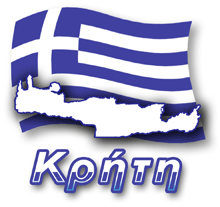
The first evidence of settlement in Crete dates back to 6000-1,100 BC - Neolithic. Houses were built during this period from dried clay or stone. The economy was based on the cultivation of land and animal husbandry.

In the period 3100-2100 BC, known as the pre-palace or early-Roman period, there are traces of the manufacture of bronze tools and the use of a potter's wheel. Some buildings from this period already have two floors. Gold jewelry is found in the graves. In the years 3000-1500 BC Minoan culture developed on the island. In 395 Crete became part of the Byzantine Empire.
In the years 824 - 961 it was under Arab rule. In 1204 it was captured by the Venetians who ruled the island for the Ottoman conquest in 1669. In 1770, the Greeks emerged and declared independence. In 1771, the Turks regained control of the island. In the years 1820-1844, the island belonged to Egypt. After another uprising from 1895-1897, Crete became an autonomous republic in 1898 under the protectorate of the Ottoman Empire. On October 6, 1908, the Republic of Crete declared independence. May 30, 1913 was included in Greece. In 1941, during the Second World War, the island was a scene of a fierce battle between the German paratroopers and the Allied troops defending it.
[ source: wikipedia.org ]

Description of the geographical location and conditions of Crete. Fig geological structure, description of the most important areas and their diversity. Examples of fauna and flora found on this island.
For people who are going to Crete for the first time, we have prepared a set of basic information useful during their stay on the island. The following topics are relevant from our point of view and we have described them based on our own experience. Of course, this article does not cover all topics, and it is likely that this toolkit will grow over time.

Crete is the largest Greek island and the fifth largest island of the Mediterranean. In spite of the strong ties that connect Crete with continental Greece, this island has retained its separate language dialect and local cultural traditions up to the present day. The distinction should also be expressed by the fact that the majority of the inhabitants asked for their descent will in the first place say that they are Cretans, and only then will they describe themselves as Greeks.
Komentarze
Wypełnij poniższy formularz aby dodać komentarz